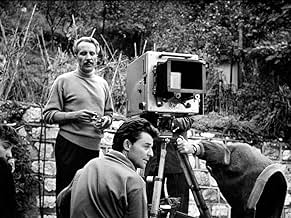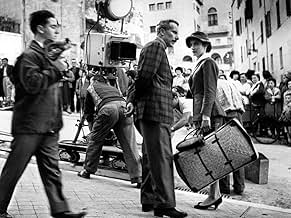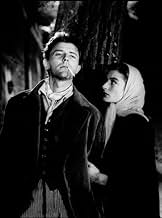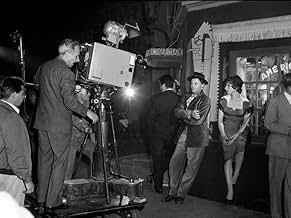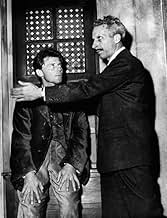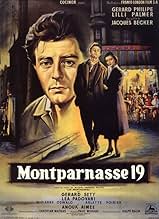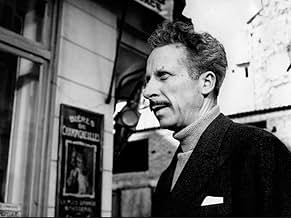IMDb-BEWERTUNG
7,3/10
1799
IHRE BEWERTUNG
Füge eine Handlung in deiner Sprache hinzuChronicling the last year of the life of Modigliani, an Italian painter living in abject poverty in Paris who falls in love with Jeanne, a girl from a wealthy family whose parents do not app... Alles lesenChronicling the last year of the life of Modigliani, an Italian painter living in abject poverty in Paris who falls in love with Jeanne, a girl from a wealthy family whose parents do not approve of him.Chronicling the last year of the life of Modigliani, an Italian painter living in abject poverty in Paris who falls in love with Jeanne, a girl from a wealthy family whose parents do not approve of him.
- Regie
- Drehbuch
- Hauptbesetzung
Pâquerette
- Madame Salomon - la concierge
- (as Madame Paquerette)
Carole Sands
- Madame Dickson
- (as C. de Rieux)
Antoine Tudal
- Cendrars
- (as A. Tudal)
Lea Padovani
- Rosalie
- (as Léa Padovani)
Empfohlene Bewertungen
The last years of Modigliani's life in Paris 1919, this famous italian-french painter not match with greatest like Cezanne and Van Gogh, but their paintings are so expensives nowadays which put him at high ground, the movie cover a few last years, he already condemned to die due the alcoolism, stayed some time in Nice near the sea to try to recover, back in Paris died still young 36 years old, sad end to true genius, neglected by many, today is honored, but too late!!! Great casting Lili Palmer, Anouk Aimée, Lino Ventura and Gérard Philipe as Modigliani.
Resume:
First watch: 2018 / How many: 1 / Source: DVD / Rating: 8.25
Resume:
First watch: 2018 / How many: 1 / Source: DVD / Rating: 8.25
A few years ago it was hoped that Anouk Aimée would attend a screening of 'Lola' at the French Institute and afterwards answer audience questions. To my great disappointment and that of many others, Mlle Aimée failed to materialise.
I had been hoping to ask her just how much influence Modigliani's daughter Jeanne had on the making of 'Montparnasse 19' which covered the final year in her father's life.
She herself was two months old when he died at just thirty-five but her birth and her mother's suicide by defenestration are absent from the film.
The other mystery of course is how much of Henri Jeanson's original screenplay was changed or jettisoned when Jacques Becker took over the direction from an ailing Max Ophuls. By all accounts Jeanson was thoroughly displeased and took legal action.
What is certain of course is that cinematographer Christian Matras has shot this in the style of Becker and not of Ophuls. There are also scenes with which Ophuls would I'm sure have felt uncomfortable, not least that in which Beatrice Hastings asks Modigliani to hit her again after he has knocked her to the floor!
However ruthless, selfish or anti-social great painters might be they are invariably excused as their behaviour is considered part of the artistic temperament or the prerogative of genius.
Although Modigliani might not have been a jackpot of admirable character traits, the compromises of film dictate that his character be sympathetic. Gérard Philippe is ideal casting in this respect. Granted, the massive ego of the artist is there but also the despair and vulnerability.
It is a pity that the character of his common-law wife Jeanne Hébuterne is so thinly drawn here but Mlle Aimée does her best.
The two performances that stand out are those of Lilli Palmer who is magnificent as Beatrice and Lino Ventura as Morel, a morally vacuous art dealer who observes Modigliani's decline like a vulture circling a dying body.
As one would expect from Becker there is a wonderful sense of period and place and his direction is taut.
There are weaknesses to be sure but one accepts those in exchange for its strengths and the film has a special quality that is hard to define.
Becker was one of the select few that received approval from the Cahiers du Cinema/New Wave contingent.
Jean Luc Godard's appraisal is insightful: "Everything rings true in this totally false film. Everything is illuminated in this obscure film."
Ophuls died shortly before the film was released and within two years both Philippe and Becker had passed away. Ars longa. Vita brevis.
I had been hoping to ask her just how much influence Modigliani's daughter Jeanne had on the making of 'Montparnasse 19' which covered the final year in her father's life.
She herself was two months old when he died at just thirty-five but her birth and her mother's suicide by defenestration are absent from the film.
The other mystery of course is how much of Henri Jeanson's original screenplay was changed or jettisoned when Jacques Becker took over the direction from an ailing Max Ophuls. By all accounts Jeanson was thoroughly displeased and took legal action.
What is certain of course is that cinematographer Christian Matras has shot this in the style of Becker and not of Ophuls. There are also scenes with which Ophuls would I'm sure have felt uncomfortable, not least that in which Beatrice Hastings asks Modigliani to hit her again after he has knocked her to the floor!
However ruthless, selfish or anti-social great painters might be they are invariably excused as their behaviour is considered part of the artistic temperament or the prerogative of genius.
Although Modigliani might not have been a jackpot of admirable character traits, the compromises of film dictate that his character be sympathetic. Gérard Philippe is ideal casting in this respect. Granted, the massive ego of the artist is there but also the despair and vulnerability.
It is a pity that the character of his common-law wife Jeanne Hébuterne is so thinly drawn here but Mlle Aimée does her best.
The two performances that stand out are those of Lilli Palmer who is magnificent as Beatrice and Lino Ventura as Morel, a morally vacuous art dealer who observes Modigliani's decline like a vulture circling a dying body.
As one would expect from Becker there is a wonderful sense of period and place and his direction is taut.
There are weaknesses to be sure but one accepts those in exchange for its strengths and the film has a special quality that is hard to define.
Becker was one of the select few that received approval from the Cahiers du Cinema/New Wave contingent.
Jean Luc Godard's appraisal is insightful: "Everything rings true in this totally false film. Everything is illuminated in this obscure film."
Ophuls died shortly before the film was released and within two years both Philippe and Becker had passed away. Ars longa. Vita brevis.
Released as a love letter to both the artist Amedeo Modigliani and the spirit of Montparnasse, Montparnasse 19 reverberates with the raw emotions of creativity and the tempestuousness of artistic existence. In this evocative narrative, the audience is transported to a world where the struggle for artistic expression collides with the fragility of life and love.
Within the dimly lit cafés and cobblestone streets of Montparnasse, Modigliani's tortured genius comes to life through the brilliant performance of Gérard Philipe. His portrayal captures the artist's paradoxes-his insatiable passion for his craft and the demons that wrestle within. Philipe breathes life into the artist's tempestuous relationships, including that with Jeanne Hébuterne, portrayed with delicate grace by Anouk Aimée, whose presence provides a poignant counterbalance to the turbulence of Modigliani's life.
Director Jacques Becker's meticulous attention to detail recreates the heart of Montparnasse's vibrant art scene-a scene teeming with eccentric characters, from painters to poets, each struggling to find their place in the world. The artistic fervor envelops the audience, inviting us to witness the intertwining threads of passion, inspiration, and sacrifice that weave the lives of these vibrant bohemian spirits.
Montparnasse 19 stands as an evocative testament to the eternal tug-of-war between art and life. Like Ernest Hemingway's A Moveable Feast and Charles Aznavour's La Bohème, it captures the essence of fleeting moments, of laughter in the face of adversity, and the melancholy that accompanies the passage of time. This film invites us to experience the intoxicating blend of love, art, and existence; and pays homage to the dreamers, the creators, and the eternal pulse of bohemian life.
Within the dimly lit cafés and cobblestone streets of Montparnasse, Modigliani's tortured genius comes to life through the brilliant performance of Gérard Philipe. His portrayal captures the artist's paradoxes-his insatiable passion for his craft and the demons that wrestle within. Philipe breathes life into the artist's tempestuous relationships, including that with Jeanne Hébuterne, portrayed with delicate grace by Anouk Aimée, whose presence provides a poignant counterbalance to the turbulence of Modigliani's life.
Director Jacques Becker's meticulous attention to detail recreates the heart of Montparnasse's vibrant art scene-a scene teeming with eccentric characters, from painters to poets, each struggling to find their place in the world. The artistic fervor envelops the audience, inviting us to witness the intertwining threads of passion, inspiration, and sacrifice that weave the lives of these vibrant bohemian spirits.
Montparnasse 19 stands as an evocative testament to the eternal tug-of-war between art and life. Like Ernest Hemingway's A Moveable Feast and Charles Aznavour's La Bohème, it captures the essence of fleeting moments, of laughter in the face of adversity, and the melancholy that accompanies the passage of time. This film invites us to experience the intoxicating blend of love, art, and existence; and pays homage to the dreamers, the creators, and the eternal pulse of bohemian life.
the temptation to see the film as one about Gerard Philipe is not small. and, in a way, it could be the basic motif for admire it. because it seems be a film for his admirers. a last word, testimony /legacy of great art. the close up, the dialogues, the reactions of Amedeo Modigliani are easy to define the last years of his interpreter. because, except that, "Les amants de Montparnasse" gives the same picture of damned artist, ignored by his contemporaries, single against the love story, fragile, vulnerable, strange. of course, a good recipes for public success. but, maybe, not the best. and this does it a homage to an unique French actor. and the beginning of the end of an age of cinema.
Every generation sees or thinks it sees things differently from previous generations; this film shows yet again that bohemian boorishness and temperamental talent is and was nothing new. If you're seen to be an Artist also being a fascinating penniless perpetual drunk yob can be acceptable, that troubled spirit is sometimes the price of Genius. Amedeo Modigliani was an Italian artist who died at 36 of TB in France, the almost impossibly handsome Gerard Philipe who played him here died the year after the film also at 36 of cancer, and director Max Ophuls died before production started – it makes this French-Italian co-production especially poignant.
The story follows the last period of Modigliani's life about 1919, after he met and fell madly in love with fellow artist Jeanne Hebuterne, their trials, tribulations and tragedy. It's all done very well, definitely not as the elegant Ophuls would have done it (witness those clumsy tracking dancing scenes) with good black and white photography and great acting: basically no problems with any of it. However the end of the film was very different to the reality and bearing in mind it was fairly frank anyway I can't understand why the truth was jettisoned at the climax. Did Modigliani's daughter object? What actually happened was incredibly sad, brutal and even incomprehensible but still would have made more sense than the end to the film did. It turned a study in romance into a lesson in sordidness.
But never mind, it was still an interesting journey into an Artist's troubled mind and life and the joy and pain he brought to those around him. I wouldn't hang one of Modigliani's hideous paintings up in my house unless I was paid a lot to; I prefer the film – because Beauty is either in the eye of the beholder or the owner.
The story follows the last period of Modigliani's life about 1919, after he met and fell madly in love with fellow artist Jeanne Hebuterne, their trials, tribulations and tragedy. It's all done very well, definitely not as the elegant Ophuls would have done it (witness those clumsy tracking dancing scenes) with good black and white photography and great acting: basically no problems with any of it. However the end of the film was very different to the reality and bearing in mind it was fairly frank anyway I can't understand why the truth was jettisoned at the climax. Did Modigliani's daughter object? What actually happened was incredibly sad, brutal and even incomprehensible but still would have made more sense than the end to the film did. It turned a study in romance into a lesson in sordidness.
But never mind, it was still an interesting journey into an Artist's troubled mind and life and the joy and pain he brought to those around him. I wouldn't hang one of Modigliani's hideous paintings up in my house unless I was paid a lot to; I prefer the film – because Beauty is either in the eye of the beholder or the owner.
Wusstest du schon
- WissenswertesMax Ophüls began directing this film but died soon afterwards. He was replaced by Jacques Becker.
- PatzerWhen Beatrice shows Modligliani the English article she has written about him, the text shown is not about him or even art at all, but rather a contemporary article mentioning, among other things, Pan-American World Airways, Gerber baby foods and the International Rescue Committee, none of which existed in 1919, when the film is set.
- Zitate
Amedeo Modigliani: And I can only offer you to share the rain with me.
- Crazy CreditsThe names of actors Lea Padovani, Gérard Séty and Lino Ventura do not appear in the closing credits, whereas every one else's name does.
- VerbindungenFeatured in Voyage à travers le cinéma français (2016)
Top-Auswahl
Melde dich zum Bewerten an und greife auf die Watchlist für personalisierte Empfehlungen zu.
- How long is Montparnasse 19?Powered by Alexa
Details
- Laufzeit1 Stunde 40 Minuten
- Farbe
- Seitenverhältnis
- 1.66 : 1
Zu dieser Seite beitragen
Bearbeitung vorschlagen oder fehlenden Inhalt hinzufügen

Oberste Lücke
By what name was Montparnasse 19 (1958) officially released in Canada in English?
Antwort
